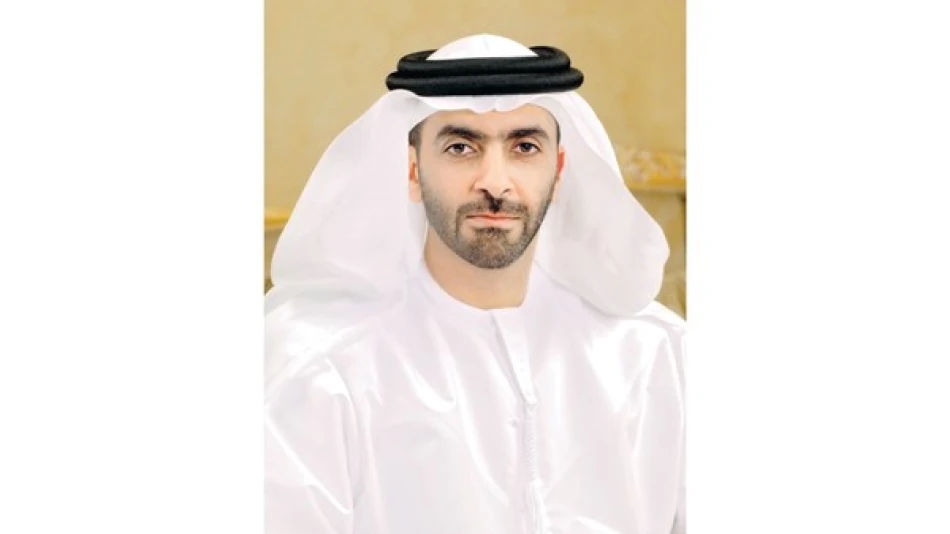
Visionary Leadership: Sheikh Mohammed's Inspiring Legacy Celebrated by Sheikh Saif bin Zayed
UAE Leadership Unity on Display as Dubai Ruler Launches New Memoir
The UAE's political establishment has rallied around Dubai's ruler Sheikh Mohammed bin Rashid Al Maktoum as he launches the first volume of his memoir "Life Has Taught Me," with Interior Minister Sheikh Saif bin Zayed Al Nahyan delivering a public tribute that underscores the Emirates' carefully cultivated image of unified leadership and continuity.
A Strategic Show of Support
Sheikh Saif bin Zayed Al Nahyan, who serves as Deputy Prime Minister and Minister of Interior, took to social media platform X to praise Sheikh Mohammed's "sixty years of wisdom and continuous giving," describing him as an "inspiring national beacon." The timing and public nature of these comments reflect more than ceremonial courtesy—they signal the UAE leadership's commitment to projecting stability and shared vision during a period of regional uncertainty.
The Interior Minister's statement emphasized that "serving the nation and humanity is the compass toward glory and leadership, and that values precede achievements, and principles rise above everything." This messaging aligns with the UAE's broader strategy of positioning itself as a pragmatic, values-driven regional power.
The Power of Political Memoirs in the Gulf
Sheikh Mohammed's decision to publish his memoir represents a calculated move in Gulf political communication. Unlike Western political autobiographies that often emerge after leaders leave office, this publication comes during his active tenure as Vice President, Prime Minister, and Dubai ruler—suggesting confidence in his legacy and a desire to shape historical narrative in real-time.
Lessons from Regional Leadership Literature
The Gulf states have increasingly embraced strategic storytelling through leadership publications. Saudi Crown Prince Mohammed bin Salman's Vision 2030 documents and various UAE leadership books serve dual purposes: domestic legitimacy building and international soft power projection. Sheikh Mohammed's memoir fits this pattern, likely combining personal anecdotes with policy philosophy.
Implications for UAE's Governance Model
The public endorsement from Sheikh Saif bin Zayed—a member of Abu Dhabi's ruling Al Nahyan family praising Dubai's Al Maktoum leader—reinforces the UAE's federal structure where different emirates maintain distinct identities while projecting unified national purpose. This dynamic has proven crucial to the country's economic success and regional influence.
Economic and Investment Perspective
For international investors and businesses operating in the UAE, such displays of leadership cohesion provide reassurance about policy continuity and political stability. The Emirates' ability to maintain this balance between emirate-level autonomy and federal coordination has been a key factor in attracting foreign investment, from cryptocurrency regulations to free zone policies.
The memoir's launch also coincides with Dubai's continued positioning as a global business hub, suggesting that Sheikh Mohammed's personal brand remains central to the emirate's economic strategy. His public profile and perceived stability directly impact Dubai's competitiveness against regional rivals like Saudi Arabia's NEOM project or Qatar's World Cup legacy investments.
Reading Between the Lines
While the tribute focuses on values and national service, the emphasis on "principles rising above everything" may reflect the UAE's approach to navigating complex regional relationships—from normalizing ties with Israel to maintaining economic relationships with Iran despite international sanctions.
The timing of this memoir and the accompanying political theater suggests the UAE leadership is actively working to cement its legacy and governance philosophy for both domestic and international audiences, positioning the country's pragmatic approach as a model for regional stability and prosperity.
Most Viewed News

 Layla Al Mansoori
Layla Al Mansoori






